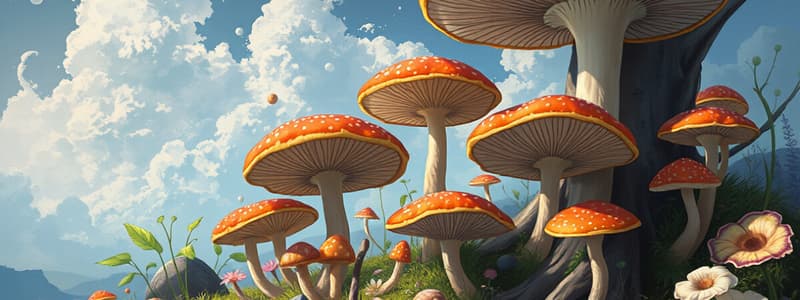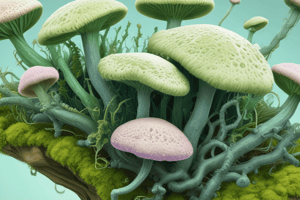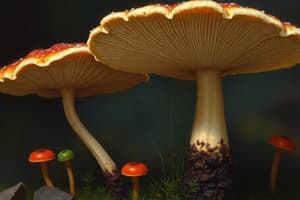Podcast
Questions and Answers
Which protist exhibits both animal-like and plant-like characteristics?
Which protist exhibits both animal-like and plant-like characteristics?
a protist that is a heterotroph and has chlorophyll
A biologist is in the process of classifying a newly discovered fungus. The fungus is a decomposer and has saclike structures. The organism most likely belongs in the same group as which of the following?
A biologist is in the process of classifying a newly discovered fungus. The fungus is a decomposer and has saclike structures. The organism most likely belongs in the same group as which of the following?
fungi that makes blue cheese
Which best describes the difference between protists that have cilia and those that have flagella?
Which best describes the difference between protists that have cilia and those that have flagella?
Those with cilia move using hair-like extensions, and those with flagella move using a single whip-like extension.
When protists and fungi are compared, which feature is unique to protists?
When protists and fungi are compared, which feature is unique to protists?
Which characteristic distinguishes the five groups of fungi?
Which characteristic distinguishes the five groups of fungi?
Which fungi group is known as the zygote fungi and produces spores in zygosporangia?
Which fungi group is known as the zygote fungi and produces spores in zygosporangia?
What is unique about the members of the group of fungi to which Penicillium notatum belongs?
What is unique about the members of the group of fungi to which Penicillium notatum belongs?
What is the role of a fungus's fruiting body?
What is the role of a fungus's fruiting body?
Which statement best describes the flower based on its physical characteristics? (Flower with 6 petals)
Which statement best describes the flower based on its physical characteristics? (Flower with 6 petals)
A botanist has discovered a new plant species and is trying to classify the plant. Its seed has one cotyledon, it has six flower parts, its leaves have parallel veins, its stem is herbaceous, and the vascular bundles in its stem are scattered throughout the stem. Which best classifies this plant?
A botanist has discovered a new plant species and is trying to classify the plant. Its seed has one cotyledon, it has six flower parts, its leaves have parallel veins, its stem is herbaceous, and the vascular bundles in its stem are scattered throughout the stem. Which best classifies this plant?
Which correctly distinguishes between how a pine tree and an apple tree reproduce?
Which correctly distinguishes between how a pine tree and an apple tree reproduce?
Which evolutionary adaptations helped plants succeed and spread on land?
Which evolutionary adaptations helped plants succeed and spread on land?
Mosses are classified as bryophytes. Which best describes mosses?
Mosses are classified as bryophytes. Which best describes mosses?
The fossil of a plant reveals that it produced spores that were used for reproduction. Which type of plant was it?
The fossil of a plant reveals that it produced spores that were used for reproduction. Which type of plant was it?
Why are seeds an evolutionary advantage for seed plants?
Why are seeds an evolutionary advantage for seed plants?
Flashcards are hidden until you start studying
Study Notes
Protists and Their Characteristics
- Protists can exhibit both animal-like and plant-like traits, acting as heterotrophs yet containing chlorophyll.
- Movement in protists varies: cilia are hair-like extensions used for movement, while flagella are single, whip-like structures.
Fungi Classification
- A newly identified fungus as a decomposer with saclike structures likely falls under the same category as fungi that produce blue cheese.
- Key distinguishing feature among fungi groups is their reproductive structure, which varies between types.
- Zygomycota is the specific group known as zygote fungi, recognized for producing spores in zygosporangia.
- Members of the Penicillium notatum group are unique due to the loss of their reproductive phase.
Role of Fungi and Plants
- The fruiting body of a fungus is responsible for producing spores necessary for reproduction.
- Morphological characteristics such as the number of petals can help classify plants; for instance, tulips with six petals are categorized as monocots.
Plant Classification and Features
- A plant with one cotyledon, six flower parts, parallel-veined leaves, and scattered vascular bundles is classified as an angiosperm and a monocot.
- The reproductive differences between pine trees (which have unprotected seeds) and apple trees (which have seeds enclosed in fruit) illustrate variations in plant reproduction.
Evolutionary Advantages of Plants
- Key evolutionary adaptations that facilitated plant survival and expansion on land include the development of vascular tissue and seeds.
- Mosses, classified as bryophytes, are characterized as seedless plants.
Significance of Seeds
- Seeds provide significant evolutionary advantages for seed plants, as they protect and nourish young plants during their early growth stages.
Studying That Suits You
Use AI to generate personalized quizzes and flashcards to suit your learning preferences.




